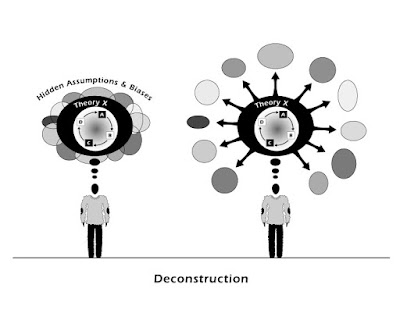It is
impossible to define Deconstruction like Philosophy or Literary criticism once
and for all. Jacques Derrida himself doesn’t
define it. Deconstruction
is not a destructive activity, but it is an inquiry into the foundations of everything.
Post-Structuralist critics go deep into the foundation of text and then they
try to undermine it. Derrida says that every text contains element which can
deconstruct itself.
As per Derrida,
“Each and every text is read as event
and events can be read with different perspective.”
He also
throws light on free play of meaning. The meaning of one word is set of another word, so one word
leads to another and so on. Derrida says “FINAL MEANING IS ALWAYS POSTPONED.”
He also talks about Phonocentricism and logocentricism
as well as Metaphysics of Presence. He denies western tendency to privilege
speech over writing by giving examples of the Binary oppositions.
If I were a
Post-Structuralist critic, I would like analyse the following advertisement of
Coca-Cola:-
After
watching this advertisement from the perspective of Derrida, we find many
things are problematic.
We find the binary oppositions like
Urban/Rural, Vegetables/ Perennial
grass, Car/Tractor, Western clothes/ Traditional Indian Clothes in this
advertisement. The language itself is problematic here and it reflects these
binary oppositions.
For example: - The dialogue between two girls
Girl 1- “ Chal chal yaha puchte hain,Kya yahan pe cold
drink milega?”(points out to farmer)
Girl 2-
(making fun) “ Haan haan cold drink kyu,
disco bhi puchte hai na idiot.”
This show
how urban is privilege over rural. The girls think that a man of rural area won’t
know about cold drink and disco.
Another example:- The farmer says,
“Ganne ke khet which tamatar kitho????”
This show
how the tomato; vegetable is privilege over sugarcane; perennial grass. By this
they are trying to look down on the people living in rural areas.
In starting also
we see a ‘Tractor’ representing rural area and a ‘Car’ representing urban area.
Similarly Clothes also signifies the differences.
Now if we go deep inside,
It can be
see that the Coco-Cola is an American multinational beverage corporation. So now
we can see India in the binary side and America or western countries in the
privilege side. The main occupation of India is agriculture. Here we can see
that a farmer or in a way Indians are looked down by the western countries.
If the
advertisement is looked without keeping Derrida in mind, People feel proud that
see even farmers know about Coco-Cola. They will happily buy this product and
they have.
Thank you.


Comments
Post a Comment